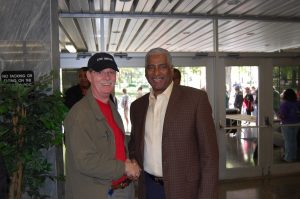
United Way of Central Alabama on announced the retirement of Harry Brown, a 33-year veteran of the nonprofit organization, whose work organizing community programs benefitted people ranging from elementary schoolchildren to senior citizens.
“There is no question that Harry’s dedication has shaped what United Way is today and has left an indelible mark on the community,” said Drew Langloh, President and CEO of United Way of Central Alabama. “There is truly no way to count the number of people who’ve been blessed by Harry’s work. From at-risk teenagers who completed youth programs Harry helped develop, to veterans who were connected with essential services, Harry’s work has made a real and tangible difference in the lives of people throughout Alabama.”
Brown retires as Senior Vice President for Planning and Community Initiatives. Throughout his tenure with United Way, his responsibilities have included developing and implementing programs that meet vital needs throughout metro Birmingham and beyond. The role is also responsible for ensuring programs are delivering their intended results and are utilizing funding and resources in a prudent, transparent manner.
Further, Brown is known within the nonprofit community for his use of detailed data and research to envision how new programs within United Way and fellow nonprofit organizations can make a difference in the community. Programs implemented by Brown in metro Birmingham have been adapted for use in additional communities throughout the state.
“I have always wanted to be sure our programs are in the best interest of the community and that we are utilizing our knowledge, our experience and our resources to improve the lives of as many people as possible,” Brown said. “At United Way, you have a great organization that is interested in making the community stronger. You have people who are committed to this vision. And it has been my honor to serve this organization and the people of Alabama.”
Brown joined United Way in 1983, bringing several years of experience in the fields of social work education, mental health and gerontology. One of Brown’s highest-profile responsibilities in recent years has been coordinating nonprofit responses to major disasters, including Alabama’s deadliest tornado outbreak.
“Harry set up and managed the long-term recovery committee for the April 2011 tornadoes, and the committee he set up and chaired ended up building almost 300 homes in two years,” Langloh said. “And it happened because he was able to bring people together and get them working in coordination with one another.”
Brown was also among the first in Birmingham’s nonprofit community to organize a comprehensive response to the HIV/AIDS crisis that began in the 1980s.
“When the AIDS epidemic started here, United Way took a stand and said it was going to be involved, and I think that was one of the really outstanding positions we’ve taken over time,” Brown recalled. “In the early days, communities had to sort through a lot of questions and misinformation about AIDS. And we decided we needed to be about helping people who were sick and making it possible for them to get services.”
Brown has also worked to create networks of services that provide a “lifespan presence” to the people of Central Alabama, ranging from education programs for children to services designed for senior citizens.
“Harry has been one of the greatest things that have ever happened to this United Way,” said Alice Williams, longtime member of the United Way of Central Alabama Board of Directors. “His vision and his ability to see the community as a whole have been absolutely extraordinary. He has been able to point us in all the right directions for all the right reasons. And we are absolutely blessed to have had him all these years.”
Throughout his tenure, Brown has helped train a new generation of nonprofit visionaries who are currently serving United Way and affiliated organizations throughout the area. Langloh said United Way will work diligently to identify the right person, or persons, who will succeed Brown and build on the foundation he leaves behind upon his retirement.
“You cannot replace someone like Harry Brown with just one person, but as an organization, we’re going to bring the right talent to the table to continue his legacy,” Langloh said.
Brown said he plans to continue volunteering with local organizations during his retirement and will be available for special projects or consulting for United Way and others. He said while much has been accomplished, much work remains to be done to help strengthen the metro Birmingham community.
“There is always a tremendous opportunity to work to change things and make them better,” Brown said. “My thoughts and ideas have found a good home here at United Way, and for that, I am truly grateful. I believe United Way of Central Alabama is on a good trajectory and I know our programs will continue to benefit people throughout this community.”